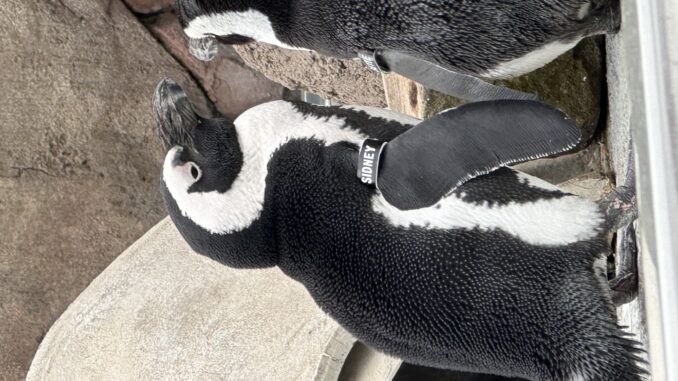
Isabella Abbott | Features Editor
March 23, 2023
Children, parents and grandparents waddled on over to the National Aviary’s Penguin Palooza last Saturday and Sunday to enjoy everything penguin-related. From 11 a.m. to 3 p.m., trivia, scavenger hunts and discovery tables were available for anyone willing to learn more about the African Penguin species.
These black and white creatures stole the show as visitors were able to watch them swim, jump and play in their habitat. If they wanted, visitors could even add on a penguin encounter to their tickets for an up-close and personal experience with one of the aviary’s flightless friends.
During the day, countless activities were available including making a penguin craft which had a lot of giddy and energetic small visitors running toward the craft table.
Here, visitors only needed one piece of paper, two googly eyes and an orange construction paper beak to make a card that resembled a penguin.
As activities were in session, visitors were encouraged to visit other areas of the aviary, like the tropical rainforest, where they could view some of the other brightly colored flying creatures in their habitats surrounded by stunning greenery.
The aviary includes a wetlands habitat, a grasslands habitat and a penguin habitat which are all designed to mimic the wild these birds may have lived in. Some main features include natural lighting, waterfalls, pebbly beaches, heated rocks and ponds.
Other mentionable birds which can be seen soaring, playing or resting throughout the many habitats include the American flamingo, bald eagle, barred owl, blue-fronted amazon and brown pelican. There’s even a two-toed sloth!
Manager of behavioral husbandry and training at the National Aviary, Jenny Owens, said many patrons attend the Penguin Palooza due to the animal’s popularity.
“I think people are really drawn to the charismatic nature of penguins in general,” Owens said. “So I think that’s why it’s really attractive for people to come and learn more about some of their favorite types of birds.”
In their Penguin Point habitat, visitors are able to view the birds outdoors, indoors and even through domed bubbles that are set up to immerse guests into the penguin’s home. Children could be seen sprinting to these domes, trying to get a penguin’s attention.
Some of these penguins are even named after celebrities like Sidney the penguin who’s unofficially named after the Pittsburgh Penguins’ Sidney Crosby.
“We have a lot of hockey fans so we have Patrick who’s named [from] the former Patrick Division of the NHL,” Owens said.
Although Patrick the penguin is female, they decided to stick with the name.
“Once she was named Patrick we didn’t know if she was a male or female, but we have since learned that she is a female, but the name had stuck,” Owens said.
Some other penguin names include Sunshine, Bette, Buddy and Holly.
Penguin Palooza isn’t just for gushing over penguins, it’s also used to share information about the endangered African Penguins worldwide.
The National Aviary works as a leader for the Association of Zoos and Aquariums Saving Animals From Extinction program.
African Penguins are an endangered species, Owens said.
“The National Aviary is actually running the Association of Zoos and Aquariums SAFE program for African Penguins right now, and that’s a collaborative effort to try and help to save the African Penguin from extinction,” she said.
The SAFE program researches why the penguin species are endangered and finds solutions for supporting penguin colonies, rescue and rehabilitation organizations, according to Owens.
“Their decline has become rapid over the last several years, so kind of figuring out why that is and working to stop that decline is important,” Owens said.
According to the National Aviary’s website, human disturbance is a big cause of endangerment. Pressures like overharvesting of fish and disasters like oil spills have caused the population of this species to decrease to 1%.
Many zoos and aquariums like the National Aviary make sure to keep the penguin populations healthy and diverse for the future. Visitors can help by buying exclusively from sustainable seafood and reducing the use of plastics.
Some upcoming events at the National Aviary include an egg-themed scavenger hunt and an Earth Day celebration. Visitors can visit the aviary’s birds every day for feeding activities.
